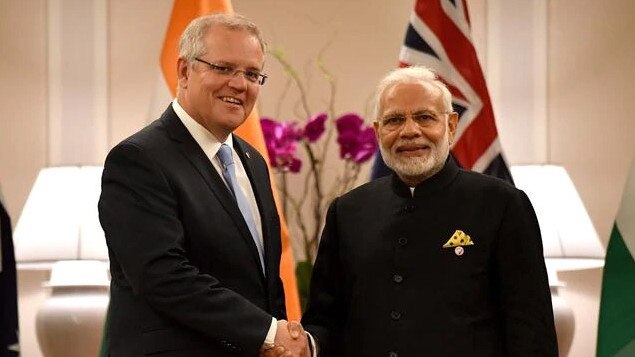Coronavirus: Scott Morrison identifies India as major trade partner
Scott Morrison and Indian counterpart Narendra Modi will cement new agreements to develop reliable supply chains in key sectors.

Scott Morrison and his Indian counterpart, Narendra Modi, will cement new agreements to develop reliable supply chains in key strategic sectors, including medical goods, technology and critical minerals, amid heightened tensions with China.
The Prime Minister will use a June 4 virtual summit with Mr Modi to ramp up efforts to diversify Australia's export markets and find trusted suppliers of vital products and components.
The leaders will seal a new defence agreement allowing reciprocal access to bases and co-operation on military technology projects, while a new education partnership will be on the table to help overcome Australian university reliance on Chinese students.
Australian farmers could also benefit, with talks under way on expanding agricultural exports to India, including barley, as China throws up new trade barriers.
The online meeting follows the cancellation of the Prime Minister’s planned state visit to India in January due to the bushfires.
The talks now have greater significance as COVID-19 exacerbates the strategic contest between the US and China, and forces like-minded countries to seek out reliable partners.
Mr Morrison said last year, ahead of his planned visit, that India was “a natural partner for Australia”, referring to the countries’ “shared values” — a point of differentiation with China.
Former Department of Foreign Affairs and Trade secretary Peter Varghese, who wrote a landmark report on the bilateral relationship in 2018, said India would be even more important to Australia in the post-COVID world. “If one of the lessons from COVID is that countries need to spread their risk, then finding new markets or building up existing markets is a crucial part of that,” he said.
Mr Varghese said India, a member of the Quadrilateral Security Dialogue with Australia, Japan and the US, was a vital strategic partner to Australia in helping “constrain China’s ambitions to be the predominant power”.
“That shared objective between Australia and India of not wanting to see the region dominated by China is a key component of building up our geopolitical relationship,” he said.
Australian Strategic Policy Institute defence program director Michael Shoebridge said Australia’s handling of the coronavirus crisis would help elevate the bilateral partnership to the next level. “The way the government, the business community and society have managed the pandemic has raised our stocks in Delhi as a trusted, reliable partner,” Mr Shoebridge said.
The summit follows recent talks between Foreign Minister Marise Payne and Indian counterpart Subrahmanyam Jaishankar on the pandemic response and Australia’s call for an independent inquiry, which was overwhelmingly backed at the World Health Assembly on Tuesday.
Senator Payne has also spoken in recent days to US Secretary of State Mike Pompeo, and counterparts in Brazil, Israel, Japan and South Korea, as democratic nations work together on a pandemic recovery plan.
Australia wants to support India to develop a domestic critical minerals processing industry, which would provide Western nations with an alternative to sourcing the materials from China.
India has strong expertise as a manufacturer of drugs and medical equipment, while Australia is a centre of biomedical research, opening the possibility for closer co-operation in the key sector.
It’s hoped a new research partnership will help Australia’s education sector to rebound after the pandemic, while also fostering closer co-operation on the development of new technologies such as artificial intelligence, machine learning and quantum computing.
By working closely with India, Australia hopes to lessen its reliance on Chinese technology, and contribute to new standards that will prevent Beijing from setting the ground rules in key areas.
Mr Morrison and Mr Modi are due to finalise a defence logistics agreement to improve the interoperability of the countries’ navies and fast-track planning for joint exercises by pre-authorising arrangements for port visits, fuel costs, supplies and personnel clearances. The logistics deal is seen as a precursor to a formal invitation from India for Australia to join its Malabar naval exercises with the US and Japan.




To join the conversation, please log in. Don't have an account? Register
Join the conversation, you are commenting as Logout